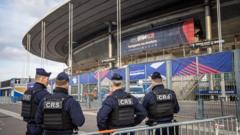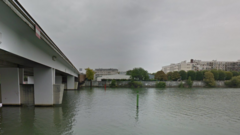Paris is ramping up its police presence for the France-Israel football match set against a backdrop of heightened geopolitical tensions and recent violence involving Israeli fans in Amsterdam.
France Enhances Security for Upcoming France-Israel Match Amid Rising Tensions

France Enhances Security for Upcoming France-Israel Match Amid Rising Tensions
Paris intensifies security measures for football match following recent violence linked to Israeli fans in Amsterdam.
In anticipation of the UEFA Nations League match on Thursday, Paris has launched a substantial security operation, deploying around 4,000 police officers, with 2,500 stationed at Stade de France and the remainder monitoring public transport and the city. This increased vigilance comes on the heels of disturbing incidents that marred a recent match between Ajax and Maccabi Tel Aviv, where fans faced violence.
Paris police chief Laurent Nuñez has classified the match as high-risk, citing an “extremely tense geopolitical context.” He stressed that efforts will focus on maintaining public order to prevent any disturbances. Officers will collaborate with approximately 1,600 private security guards at the stadium and an elite anti-terrorist unit will ensure the safety of the visiting Israeli team.
Participation from Israeli fans is expected to be limited, following recommendations from the Israeli government that suggest only about 100 fans travel to France. The stadium, with a capacity of 80,000, is expected to be sparsely populated for safety reasons. The recent attack on Maccabi fans in Amsterdam has drawn sharp criticism across Europe, with rising concerns about antisemitism.
In response to the unrest, French President Emmanuel Macron is set to attend the match, aiming to convey solidarity with the Jewish community. He will be joined by Prime Minister Michel Barnier and other dignitaries. Meanwhile, preparations include stringent checks for those attending the match, and local bars and restaurants will close in the afternoon to facilitate security measures.
Despite protests from the far-left France Unbowed party, which argues for a cancellation of the match due to the ongoing conflict involving Israel and Palestine, officials have firmly stated that the event will proceed. Interior Minister Bruno Retailleau emphasized France's resolve not to concede to those spreading hatred.
Tensions in Franco-Israeli relations have escalated in recent weeks amid contentious remarks from both Macron and Israeli Prime Minister Netanyahu concerning the situation in Gaza and Lebanon. Recently, clashes erupted in the city center as pro-Palestinian and anti-racist groups demonstrated against the match, leading to police interventions with tear gas to manage unrest.
As Macron navigates the complex dynamics of Middle Eastern relationships, the upcoming match stands at the intersection of culture, politics, and security, symbolizing broader societal tensions in Europe.
Paris police chief Laurent Nuñez has classified the match as high-risk, citing an “extremely tense geopolitical context.” He stressed that efforts will focus on maintaining public order to prevent any disturbances. Officers will collaborate with approximately 1,600 private security guards at the stadium and an elite anti-terrorist unit will ensure the safety of the visiting Israeli team.
Participation from Israeli fans is expected to be limited, following recommendations from the Israeli government that suggest only about 100 fans travel to France. The stadium, with a capacity of 80,000, is expected to be sparsely populated for safety reasons. The recent attack on Maccabi fans in Amsterdam has drawn sharp criticism across Europe, with rising concerns about antisemitism.
In response to the unrest, French President Emmanuel Macron is set to attend the match, aiming to convey solidarity with the Jewish community. He will be joined by Prime Minister Michel Barnier and other dignitaries. Meanwhile, preparations include stringent checks for those attending the match, and local bars and restaurants will close in the afternoon to facilitate security measures.
Despite protests from the far-left France Unbowed party, which argues for a cancellation of the match due to the ongoing conflict involving Israel and Palestine, officials have firmly stated that the event will proceed. Interior Minister Bruno Retailleau emphasized France's resolve not to concede to those spreading hatred.
Tensions in Franco-Israeli relations have escalated in recent weeks amid contentious remarks from both Macron and Israeli Prime Minister Netanyahu concerning the situation in Gaza and Lebanon. Recently, clashes erupted in the city center as pro-Palestinian and anti-racist groups demonstrated against the match, leading to police interventions with tear gas to manage unrest.
As Macron navigates the complex dynamics of Middle Eastern relationships, the upcoming match stands at the intersection of culture, politics, and security, symbolizing broader societal tensions in Europe.


















